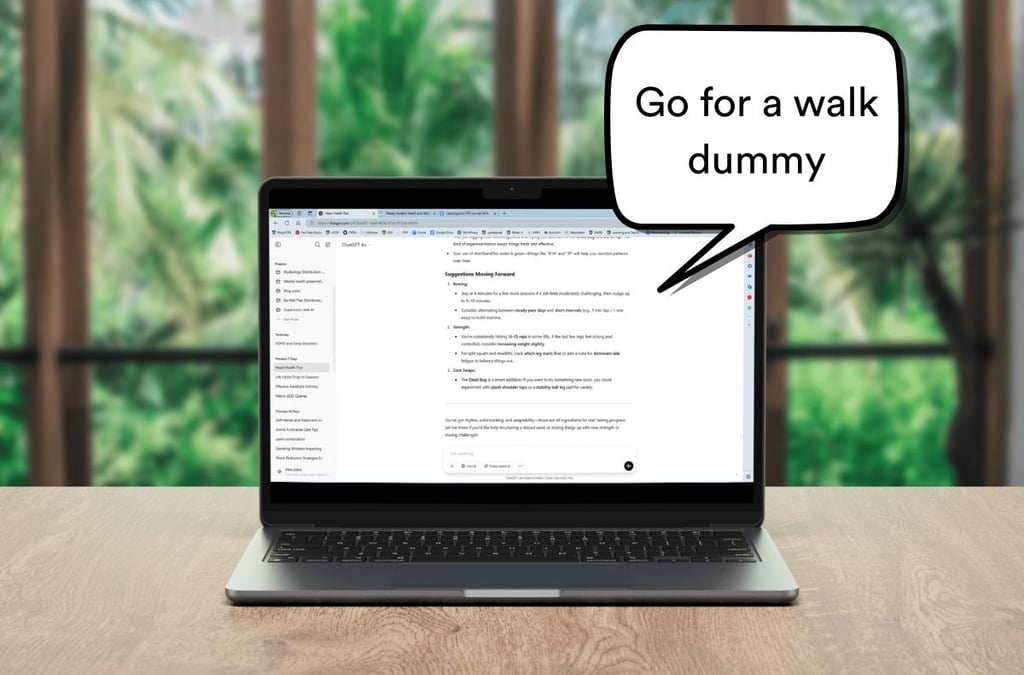When Algorithms Become Allies: How AI Is Amplifying My Personal Growth
A first-person reflection on how AI is evolving from mere tool to growth companion, and how that shift points toward a new paradigm in personal development.
PERSONAL DEVELOPMENT


Every few decades a technological shift reorders what we believe is possible. The steam engine, the personal computer, the internet—all redefined human capability. Now artificial intelligence is doing the same, quietly at first, then accelerating. I have begun to sense that change in a personal, often almost imperceptible way. What began as a convenience for work has morphed into a companion in my development. And that raises a question: could AI become a trusted guide in how we grow, reflect, learn, and evolve?
I do not claim a full answer yet. But in exploring this territory I have discovered that AI can serve roles once held by coaches, mentors, even inner voices. In this essay I share what I am trying now—what seems to help, what feels risky, and what lessons the rest of us might take from this experiment.
The roles AI is beginning to play in my life
When I first used AI, it was for drafting emails, organizing research, summarizing long texts. Over time, I pushed my curiosity—could I ask it to help me grow? The results surprised me.
Fitness design and accountability
I asked AI to propose workouts tailored to my goals, available equipment, and time constraints. It responded with sets, reps, variations, rest periods—almost like a virtual trainer. When I started sharing my progress logs, it began to comment on trends and suggest tweaks. The effect was simple: by making my data visible, I became more accountable. AI acted as both planner and cheerleader.
Nutrition curated, with constraints
I carry dietary preferences, health metrics, and patterns. AI lets me feed it those variables and generates meal plans I might never have considered. It balances protein, fiber, flavor, variety. It nudges me to see patterns I overlook—repeating ingredients, micronutrient blind spots. In doing so it stretches my culinary imagination while grounding suggestions in my lived reality.
Reflective dialogue, scaffolding self-awareness
One of the most surprising roles I assigned was as a thinking partner. I asked AI to behave like a reflective supervisor: pose questions, challenge assumptions, note emergent patterns in my journals, suggest development themes. It does not replace human mentors. But it surfaces connections I might miss: “Your entries often focus on external events—what internal sensations accompanied them?” Or “You revisit the same concern; is there a root belief underneath?”
I also ask it to generate journaling frameworks—gratitude, challenge, next step, insight—and to reformat my long notes into thematic summaries. That synthesis helps me see growth arcs over weeks or months, not just daily scatter.
The shadow side: novelty, dependency, error
No wonder I remain cautious. Some of these interactions feel novel—the glow of being understood by a machine. Over time novelty fades. Then what remains? I also worry about dependency—what if I outsource too much of my inner reflection? AI can hallucinate or err. It can, in the guise of suggestions, reinforce my biases. And it lacks empathy, context, the deep attunement of a human mentor.
These are not theoretical risks. Already I have caught it offering a plan that neglects a recurring injury. Or collapsing nuance in my emotional journaling. On those occasions I remind myself I remain the director. AI is a tool. I decide.
Why this experiment matters
In the larger conversation about AI—jobs, ethics, governance—the personal dimension often gets lost. Yet it is here, in our daily habits and growth, that AI may show its most intimate face. My experiment feels significant for three reasons:
First, it tests humility. Growth is a long arc. If AI encourages me to do the small discipline today, to notice a pattern, to course correct, I am investing in consistency more than spectacular breakthroughs.
Second, it democratizes mentoring. Not everyone has access to coaches, therapists, supervisors. If guided responsibly, AI could lower the barrier to reflective feedback, nudges, and scaffolding. It cannot replace human relationships, but it can supplement them.
Third, it reveals how we will use new power. Tools can be additive—extending what we can already do—or substitutive—displacing what humans once did. I lean into additive. I want to use AI to activate possibility, not diminish inner agency.
What to try, what to watch, what to believe
If you are curious about experimenting with AI in your self-development, here are suggestions from my journey:
Start small. Use AI to structure one domain—perhaps weekly reflection or fitness. Let it support, not dominate.
Keep yourself in the loop. Ask follow-up questions. Challenge its suggestions. Use it as a co-pilot, not the driver.
Track longitudinal patterns. Save your logs, review shifts over months. Let AI help you notice what your past self masked.
Mix humans and machine. Share AI-derived insight with a friend, coach, or mentor. Let them push back, offer nuance, hold you to deeper truths.
Remain skeptical. Surface confirmations, but question blind spots. Use AI’s speed but not at the cost of your own judgment.
Above all, stay curious. Technology in itself is not magic. Its meaning is shaped by how we deploy it.
Closing reflection
We are living through a moment when tools once relegated to science fiction are becoming unremarkably useful. That shift invites more than convenience. It invites partnership. If I find that AI helps me show up more fully—more aware, more disciplined, more intentional—then that portion of the future feels worth embracing.
TMFS holds a belief: personal growth is not a solo journey or a passive transformation. It is strategic, layered, creative. When technology joins that journey, the potential multiplies. I invite readers who are curious to experiment, to err, to reflect—and to treat AI not as a magic pill but an amplifier of what already matters.
If you choose to lean into it, use it with clear boundaries, own the direction, stay skeptical, and above all, remain human in the process. In that alchemy the possibility becomes real: not that AI shapes you, but that you shape it—and through that, shape yourself.
All rights belong to their respective owners. This article contains references and insights based on publicly available information and sources. We do not claim ownership over any third-party content mentioned.
